
As the Third Reich annexed the Sudetenland and Poland and the German war machine pushed through the Eastern Front towards the Soviet Union, millions were left dead, cities were reduced to rubble, and Europe was left destitute and desperate to rebuild. In addition to the immense loss of human life, the Nazis also stole countless pieces of art, jewelry, furniture, and other valuables from individuals and state institutions. In an attempt to protect their treasuries from German seizure, some Eastern European countries entrusted the United States and the United Kingdom to temporarily protect their gold reserves.
In the years following the war, many of these regimes witnessed the return of their national treasures and gold. However, recognizing that political stability in post-war Czechoslovakia was exceptionally fragile, the American and British governments held onto approximately eighteen tons of Czechoslovak gold for safekeeping. Due to a standoff with the Czechoslovak government over American property claims, the U.S. maintained guardianship over the gold until, on November 6, 1981, the U.S. agreed to return the gold to Czechoslovakia.
Ronald J. Neitzke, the Country Director for Czechoslovakia and Albania from 1981 to 1983, recalled the negotiating process that had unraveled between the Czechoslovak and American governments in the years immediately leading up to the eventual compromise in an interview with Charles Stuart Kennedy in December 2006.
George Jaeger briefly describes ships taking gold from Europe from the UK in 1940. Follow the links to read more about World War II, the Cold War, or economics. Read about the return of the Crown of St. Stephen, kept at Fort Knox for more than 30 years, to Hungary.
“Among older East European hands, ‘Czech Claims/Gold’ was almost legendary”
Ronald J. Neitzke, Country Director for Czechoslovakia and Albania, (1981-1983)
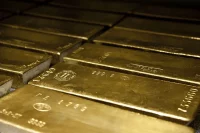
NEITZKE: [In 1981] I became country officer for Czechoslovakia and Albania; again, a fluke of timing. It was one of the most intense and interesting jobs I ever had, mainly because of a series of negotiations I got involved in. The most important was on the issue of “Czech Claims/Gold.”
In June, when I returned to the Department, we were at a make-or-break point in negotiations with the Czechs over our demand for the payment of claims owed to U.S. citizens for property the Czech communist government began confiscating in 1948. The Czechs were demanding the return of their share of the Nazi-looted gold recovered by Allied forces at the war’s end.
Among older East European hands, Czech Claims/Gold was almost legendary. It was thought by many to be unsolvable, for a number of reasons, some having to do with the hold that a few angry Czech-American claimants had on key Congressmen and Senators. Yet it wouldn’t go away and had bedeviled generations of Czech desk officers, ambassadors to Prague, and others in East European Affairs.
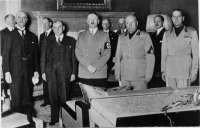
The Nazis had looted gold from every nation they conquered and occupied. I’m talking here about gold looted from the treasuries of victim governments, not the gold looted from individual victims of Nazi persecution, although there may have been a small bit of intermingling.
At the end of the war the victorious Allied armies rounded up as much of this gold as they could find, inventoried it, and stored it for safekeeping in their national repositories.
The Allied governments then set up in Brussels a group called the Tripartite Gold Commission, tripartite because its members were the U.S., Britain, and France.
The job of the TGC was to review claims by Nazi victim governments for gold losses, establish which governments were entitled to how much of the recovered gold, and return the bulk of that gold to them, keeping a small amount in reserve until the TGC itself made final apportionments and went out of business. The amount of gold retrieved and placed under TGC control was only about two-thirds of the amount that the various victim governments claimed to have lost.
“The lawyers too had their eye on the money; their fees would now be huge”
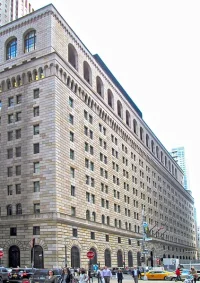
By 1981, the only victim governments that had not received the bulk of their apportionment of the recovered gold were Czechoslovakia and Albania, and all of the remaining gold was stored in the New York Federal Reserve Bank (seen left) and the Bank of England in London.
Washington and London had blocked TGC gold distributions to both governments until U.S. and British citizens received compensation for property claims. There were other issues to be resolved in any deal with Tirana, but with the Czechs the problem was unresolved claims.
By the early 1960s, the U.S. Foreign Claims Settlement Commission had established exactly who was entitled to how much compensation from the Czech government. The total figure was over $110 million, which I think was $60-some million in principal plus accrued interest.
At least two earlier tentative agreements with the Czechs on claims/gold, one in the 1960s and one in the early 1970s, had been informally rejected by the Congress. In the meantime, the TGC in Brussels had grown moribund, staffed only by an elderly, likeable but somewhat eccentric retired British civil servant.
In the mid-1970s lawyers for some of the aging Czech-American claimants began building the case for the USG to seize the so-called “Czech gold” in the New York Fed, sell it, and use the proceeds to resolve claims. This effort had little traction at first but gradually gained a few key backers in Congress.
Meanwhile, the unresolved claims/gold issue was a year-in, year-out staple of our dialogue with Prague. Partly because of Czech resistance to paying the whole claim – we had settled with other countries for cents on the dollar – and partly because we couldn’t tell the Czechs, after backing away from the other two tentative agreements, exactly what figure would satisfy Congress and the claimants, we made no progress in resolving the issue.
Two elements of the situation changed dramatically between late 1979 and early 1981. The price of gold skyrocketed, making the “Czech gold” in the New York Fed much more attractive to Prague, and, partly for the same reason, the claimants and their by-then more formidable and aggressive group of high-end Washington lawyers persuaded the Congress to act. The lawyers too had their eye on the money; their fees would now be huge.
The attorneys prevailed on an influential group of Senators and Congressmen to introduce legislation to seize and sell the “Czech gold” in the Fed and, from the proceeds, make direct restitution to the American claimants.
The Administration, while sympathetic to the claimants, strongly opposed seizure of the gold as a gross violation of our treaty obligations. The TGC gold in the New York Fed was not legally “Czech gold;” it was held there jointly by the U.S., British, and French governments.
“At the last minute the Czechs budged”
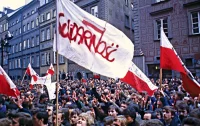
The climate for any kind of deal with an East European regime was rapidly chilling. In Poland the Solidarnosc [Solidarity] movement was in full swing, pushing hard against the limits of Soviet tolerance. By the end of 1981 martial law had been imposed in Poland. The hard-liner Czech regime had long been among our least favorites in the area.
The political atmosphere there had grown uglier in the period since Prague Spring. Yet, under pressure from the American claimants, their attorneys, and a threatening Congress, the new Administration had to try to reach a claims/ gold deal with Prague, and quickly.
The Congress had imposed a deadline for reaching a deal. The claimants’ attorneys and Congress were demanding a claims settlement which, on a percentage basis, would have been incomparably higher than claims settlements the U.S. had reached with any other communist government. To be forced to pay such a settlement under threat of U.S. seizure and sale of what it considered part of its national patrimony was acutely embarrassing to the Czechs.
Moreover, even if we and the Czechs came to terms, unless the Brits and the Czechs reached a similar timely deal, we couldn’t officially release the gold and the Congress would act unilaterally. And the French, who held no gold, had no unsettled claims, and thought the whole enterprise pretty tawdry, threatened to stand on principle and withhold their consent to the release of the gold if our consent were tied to the payment of claims.
And there was the problem of the mechanism for executing such a deal, requiring a simultaneous transfer of claims payments to the U.S. and UK Governments and physical transfer of the gold to Czech authorities.
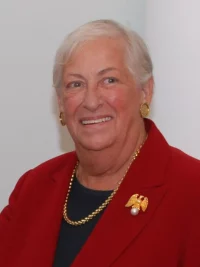
When I arrived in June 1981, the negotiating effort, headed by [Rozanne] Roz Ridgway (seen left), was at wit’s end. My predecessor handed me a draft memo premised on the likely failure of the effort, looking toward what would have to be done to clean things up after the mess that would result from Congress’ ordering seizure and sale of the New York gold.
At the last minute the Czechs budged. Not a great deal, but enough to give us something to work with. And before long they came across with a claims settlement offer we could accept. Then a whole new set of negotiations began.
And for the next several months I often lived out of a suitcase, traveling with a small team from the Legal Advisor’s office, Treasury, and Ambassador Ridgway on occasion, to various combinations of Prague, Brussels, London, Paris, and Zurich.
Zurich because that was where the Swiss Bank Corporation [SBC], our chosen agent for executing the deal, was located. The aim of these negotiations was to resolve the particulars of the bilateral claims settlement, finalize the simultaneous claims and gold transfer mechanism and nudge the Brits and Czechs to come to terms on their own bilateral problems before time ran out….
“Everything would have to be done quickly, with precise timing, and in utmost secrecy”

In any event, since neither we nor the Brits trusted Prague, nor they us, the deal would have to be airtight. And the claimants’ attorneys would need constant reassurance that nothing would go wrong.
An additional obstacle, the one which in many ways entailed the greatest risk, relates to the fact that large amounts of gold are almost never physically transferred, let alone flown over vast oceans from one country to another.
When it’s transferred between governments, or central banks, gold is usually just moved from one pen to another in a central bank holding facility.
But the Czechs were not about to trust us to hold onto it for them; it would have to be moved physically from New York and London to Zurich and held there under SBC auspices in the narrowest possible time window, until the simultaneous gold and claims payment transfers took place.
Which presented other problems, since once the gold arrived in Zurich, in limbo in a sense, there was a risk that anyone of any nationality with any claim against the Czechs could ask a Swiss court to seize it pending resolution. The Czechs too would have to preposition the monies to be paid the U.S. and UK through the SBC.
So everything would have to be done quickly, with precise timing, and in utmost secrecy. Near the end, a couple of the key players got cold feet, fearing lawsuits in the event anything went wrong, and had to be indemnified against risk. And the lawyers and their claimants grew extremely skittish about any arrangement that would have the gold leaving physical U.S. control before we had the claims settlement.
Yet, one month after martial law was imposed in Poland, when almost nothing else positive was going on with Prague or the rest of Eastern Europe, we pulled it off. We finalized our claims settlement; the Czechs would pay a record 100 percent of principal plus some interest. We got the claimants’ lawyers and congressional staff to back off and give us a bit more time. We finalized an extremely complicated settlement mechanism that was satisfactory, though just barely, to everyone.

In a sometimes subtle, sometimes heavy-handed way, we prodded the Brits and Czechs, though mainly the Czechs, to come to terms with one another so that our deal could go through. We convinced the French to hold their noses, abandon principle, at least briefly, and let this happen.
And then, assembled in Zurich awaiting the final go-ahead, we held our breath as a huge amount of gold was quietly moved out of the New York Fed to JFK [John F. Kennedy in New York] Airport, and out of the Bank of England, to planes bound for Zurich.
When the planes landed in Zurich on the date of the deal, a Saturday, if I recall, to lessen the chances of a successful legal attachment, the gold was briefly offloaded to a warehouse where some in our delegation were allowed to examine it and, from what I later heard, went just a little crazy.
But, as I said, it happened. The Czechs did not balk; they had prepositioned the money, for us and the Brits, as agreed. Working through the SBC, the codeword was passed and the deal was done. The Czechs hurriedly loaded the gold onto their own plane and took off.
“What happens if a plane goes down with the gold?”

[The lawyers were] ecstatic. They made massive fees. As difficult as the Czechs could be, the claimants’ big-name lawyers were my least favorite players in all of this.
From my first dealings with them it was clear that they regarded nearly everyone at State, with the notable exception of Ridgway, with something bordering on contempt, as though we were incompetently standing between them and, well, literally, a pot of gold.
This was my introduction to a corner of Washington that few in the bureaucracy, at least at lower and mid-levels, come in contact with — the world of the arrogant, pushy, wildly- overcompensated Washington lawyer-lobbyists. Nice bunch of guys.
And, by the way, not a word of recognition from any of them, again except for Ridgway, when we did, in fact, pull off the nearly impossible and in the process vastly enrich them. Most of the American claimants were pleased with the settlement, if not in absolute terms, at least compared to what they might have received under other circumstances.
For their part, the Czechs soon put some of the gold on public display, trying to portray the deal as a regime-legitimizing move by two Western governments, which it wasn’t, and as belated restitution for a great injustice done to the Czech and Slovak peoples, which, in part, it was.

[Jaromir] Johanes, their hard-line ambassador in Washington, became Deputy Foreign Minister. Roz Ridgway’s negotiating counterpart, [Michael] Zantovsky (seen left), went on to become Czech Ambassador in Washington, and the other Czechs involved reportedly also fared well.
A lot of people contributed a lot of different talents. After Ridgway had elicited from the Czechs the acceptable gross settlement offer, it fell to me to become the day-to-day organizer and clearing house for most aspects of the months long negotiations that followed, pulling in Ridgway when needed, putting together various negotiating teams for various trips, making suggestions to resolve substantive problems during the talks, fielding hundreds of calls from anxious claimants, meeting with attorneys and Congressional staff, trying to convince them to trust us to pull this off, keeping the Brits and the French and the TGC head apprised of what we were doing, and devising ways, including a pretty strong demarche to the Brits and the Czechs, aimed at pushing them toward agreement.
In the end, when we were all a little bleary-eyed, I helped check and recheck all the documents to ensure they were as agreed. In between, there was a steady stream of memos to my own front office – preoccupied with Poland and frankly very doubtful we’d actually succeed – and to Assistant Secretary [Lawrence] Eagleburger and others….
What happens if a plane goes down with the gold? I don’t recall whether it was insurable, but its loss would have queered the deal, since the Czechs wanted the gold.
Or what happens if an international criminal group gets wind of the fact that there will be nearly a quarter of a billion dollars worth of gold bullion sitting in a lightly guarded airport warehouse in Zurich for a few hours — the entire deal, I believe, was in the range of $300-$400 million. And this was 1982. Or, what if any of thousands of people with claims against the Czech Government got to a Swiss court and managed to have the gold attached indefinitely?
“A military attaché was beaten up and drugs were planted on another officer to create a scene”

The odds were not with us, but as the process went on, our superiors in the Department and the NSC kept giving us more and more rope, as it were, without, until the very end, expecting that this would actually happen, that we’d succeed.
I think [the Czechs] calculated that the ignominy of having “their” gold seized and sold would have been more damaging to their image than was the embarrassment of being forced to pay us a huge claims settlement. And in pure dollars and cents, the Czechs got more than they gave.
In the earlier political level discussions, there had been soundings from the Czech side about the possibility of a claims/gold settlement leading to Most Favored Nation [MFN] trading status for Prague. We told them that while anything was possible given the right circumstances down the road, we could offer no assurance of any sort regarding MFN in the context of claims/gold.
Still, I think the Czechs held out some hope, at least initially, but as the security situation in Poland began to tighten in the latter months of 1981, no one in the USG was talking about MFN for the Czechs under any conceivable circumstances.
Despite the grim regional security situation, we still expected that in the wake of this deal we might be able to take some further practical steps with Prague. We were wrong. The bilateral atmosphere quickly turned nasty, partly as a consequence of rising East-West tensions over Poland.
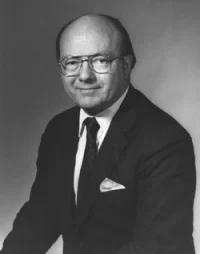
The Czechs stepped up their harassment of our personnel in Prague; a military attaché was beaten up, I recall, and drugs were planted on another officer to create a scene. And there were several high-level denunciations of President Reagan, complete with Nazi allusions.
Our Ambassador in Prague at this time was Jack Matlock (seen right), who was more than capable of giving as good as he got in any ugly standoff with the Soviets, let alone the Czechs; but it was a very difficult period. When things eventually calmed down a bit, we undertook another negotiation with Prague involving much lower stakes, but something of the same dynamic as claims/gold.
We’d been making Social Security payments to recipients living in Czechoslovakia, while Czech authorities had long refused to make somewhat similar payments to former Czechs living in the U.S. We demanded reciprocity and threatened to begin withholding Social Security payments unless the Czechs started paying. There wasn’t a lot of money involved, but it was hard currency, and the Czechs could do the math and knew that even with an agreement they’d still be taking in more than they paid out.
But even a negotiation as seemingly simple as this took a while to crank up, get [the Social Security Administration] and others on board, and work out details over talks in Prague and Washington. So, more travel. But we managed to pull this one off too.
